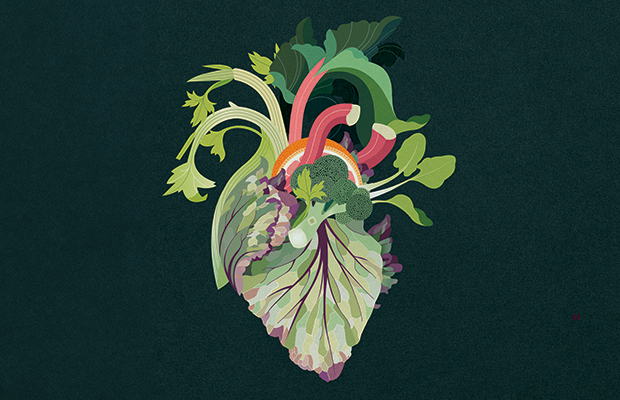BHF Senior Dietitian Victoria Taylor explains how choosing to eat fruits, vegetables and wholegrains while avoiding salty, sugary treats and alcohol can help keep hypertension in check.
 |
| Illustration by Sally Caulwell |
If you have high blood pressure (hypertension), one of the tools you can use to help keep it under control is your diet.
In the early 1990s, researchers at the National Heart, Lung and Blood Institute in the USA created a diet especially with this in mind. Called the DASH diet (Dietary Approaches to Stop Hypertension), it’s been shown to be helpful by numerous studies. Here we summarise its key points, and look at evidence-based tips from other research.
4 foods that lower blood pressure
1. Fruit and vegetables
Research, including some funded by British Heart Foundation, has suggested beetroot juice might help lower blood pressure. Beetroot juice can be a concentrated source of nitrates and it’s thought that one of their effects is to lower blood pressure. However, you can also find nitrates in other fruits and vegetables too including spinach, celery, kale, bananas and strawberries.
All fruit and vegetables provide us with potassium, which can help lower blood pressure
As well as nitrates, all fruit and vegetables provide us with potassium, which can also help lower blood pressure. It’s best to get the potassium we need through foods, rather than supplements. Too much potassium can be harmful, as it can affect the rhythm of the heart. This is especially dangerous for people with kidney problems and people taking certain kinds of water tablets. Only take potassium supplements if your doctor has prescribed them.Tip: Instead of focusing on one kind of fruit or vegetable, just try to make sure you eat at least five portions every day. By choosing a variety of different coloured fruit and vegetables, you’ll benefit from the wide range of nutrients they provide.
2. Wholegrains
Wholegrains such as brown rice, wholemeal bread and oats contain more nutrients and fibre than refined starchy carbs like white bread, pasta and rice. Eating more fibre has been linked to a lower risk of heart and circulatory diseases. Soluble fibre from oats (called beta-glucans) may help in lowering blood pressure. A diet higher in fibre is advised if you are trying to lose weight, which will also help lower your blood pressure.Tip: Choose high-fibre, starchy carbs at all your meals as an easy way to up your fibre intake. Try including other high-fibre foods, such as beans and lentils, nuts and seeds, and fruit and vegetables.
3. Lean protein
Lean sources of protein are lower in calories than fattier sources but are still filling. This can help you to manage your weight, which is helpful in lowering blood pressure.Tip: Choose chicken, turkey, fish, eggs and beans instead of red and processed meats.
4. Low-fat dairy
Including milk and dairy foods as part of a healthy, balanced diet could help with lowering blood pressure. Dairy products contain a complex combination of nutrients, including calcium which has been linked to blood pressure reduction.Tip: Low-fat dairy like semi-skimmed milk and low-fat natural yogurt gives calcium and protein without excess saturated fat.
What else can help lower my blood pressure?
Diet is not the only factor when it comes to reducing blood pressure. It is also important to take any medicines that you have been prescribed and consider other changes that could help such as:
- being more physically active
- stopping smoking
- maintaining a healthy weight.
4 foods to avoid with high blood pressure
You don’t necessarily need to completely exclude these foods but be mindful about how much you eat.
1. Salty foods
We should have no more than 6g of salt a day, which is about a teaspoon. But many of us eat more than this.Tip: Most of the salt we eat is already in our food when we buy it in things like olives, crisps, sauces and pickles. It is also in processed meats like ham, bacon and sausages, as well as staples like bread and breakfast cereals.
Tip: Check food labels to look for low-salt options and cut back on high-salt foods. Try to cut down on eating out and takeaway foods, too, and make your own lower-salt versions at home.
2. Sugary and fatty foods
Sugar and fat may not directly affect your blood pressure, but foods that are high in fat and sugar are high-calorie foods. Eating too much of them can lead to weight gain, which is linked to raised blood pressure.Tip: Plan to have healthy snacks like fruit or plain yogurt if you get hungry between meals. Take something with you like a handful of nuts and dried fruit for when you are out and about.
3. Alcohol
Drinking too much alcohol can raise your blood pressure. If you drink alcohol, do so in moderation. Too much can raise blood pressure and lead to weight gain over time.
Tip: Keep well within government guidelines of no more than 14 units per week. Space out any days that you drink alcohol out and have some alcohol-free days as well.
4. Excess caffeine
Caffeine can raise blood pressure but its effect is usually short lived and lessens when you drink it regularly. That means a moderate intake, 4-5 cups a day, should not be a problem for most people.
However, some people are more sensitive to caffeine than others and drinking too much caffeine may affect blood pressure.
Tip: Remember caffeine is not only in coffee and tea, it’s also in energy drinks, chocolate and soft drinks like colas.
Comments
Post a Comment